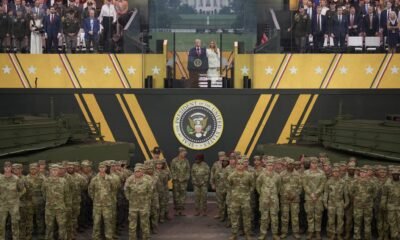cct-tracking
Insider Trump Campaign Secrets Leaked, News Outlets Opt to Stay Silent

In a notable turn of events, at least three major news organizations have received confidential documents from inside the Donald Trump campaign, including a vetting report for vice presidential candidate JD Vance. However, none of these outlets have disclosed the specific information contained in the materials, instead choosing to speak in general terms about a possible hacking incident.
Organizations such as Politico, The New York Times, and The Washington Post have reported on the situation, contrasting sharply with the 2016 presidential campaign’s response to the Russian hacking of Hillary Clinton’s campaign manager’s emails. During that time, WikiLeaks disseminated a large volume of internal communications that garnered extensive media coverage.
Politico noted the receipt of emails from an individual identified only as “Robert,” which included a 271-page campaign document on Vance and additional material regarding Senator Marco Rubio. Both Politico and The Post validated the authenticity of these documents through independent sources.
The New York Times noted that the Vance vetting report included past remarks that could be potentially damaging, particularly comments in which Vance criticized Trump. However, the identity of the leaker remains uncertain, as Politico reported that the individual refused to clarify how he obtained the documents. When asked, he advised caution regarding inquiries into their origins.
On the cybersecurity front, the Trump campaign claimed it had been hacked by Iranian operatives, though no evidence has been provided to substantiate this assertion. This claim followed a Microsoft report discussing efforts by Iranian military intelligence to gain access to a former senior advisor’s email account, without naming the specific campaign involved.
In response to the leaks, Trump campaign spokesperson Steven Cheung accused media outlets of aligning with foreign adversaries by publishing internal documents. Meanwhile, the FBI has confirmed it is investigating the matter.
Despite the significant implications of the leaks, The New York Times and The Washington Post both opted not to share details about the internal communications, citing considerations of authenticity, source motives, and public interest. Politico’s editorial team decided that the circumstances surrounding the documents were more newsworthy than the contents themselves.
Unflattering remarks about Trump from Vance have resurfaced following his appointment as Trump’s running mate, further intensifying scrutiny.
Reflecting on past lessons, experts observe the contrast between the current media environment and that of 2016, when Trump’s team cited leaked documents from the Clinton campaign without hesitation. In a cautionary note, Kathleen Hall Jamieson, a communications professor, emphasized the importance of careful evaluation of sources in today’s misinformation landscape.
While some journalists, like ProPublica’s Jesse Eisinger, argue that these outlets could have provided more context regarding what the vetting documents indicated about Vance’s candidacy, the overarching sentiment is that prudence is key. Striking a balance between newsworthiness and the reliability of sources remains a significant challenge for media in the current political climate.

















